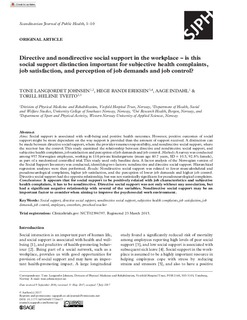| dc.contributor.author | Johnsen, Tone Langjordet | |
| dc.contributor.author | Eriksen, Hege Randi | |
| dc.contributor.author | Indahl, Aage | |
| dc.contributor.author | Tveito, Torill Helene | |
| dc.date.accessioned | 2018-05-25T09:45:42Z | |
| dc.date.available | 2018-05-25T09:45:42Z | |
| dc.date.created | 2017-09-12T14:11:14Z | |
| dc.date.issued | 2017 | |
| dc.identifier.citation | Scandinavian Journal of Public Health. 2017, 1-10. | nb_NO |
| dc.identifier.issn | 1403-4948 | |
| dc.identifier.uri | http://hdl.handle.net/11250/2499243 | |
| dc.description.abstract | Aims: Social support is associated with well-being and positive health outcomes. However, positive outcomes of social support might be more dependent on the way support is provided than the amount of support received. A distinction can
be made between directive social support, where the provider resumes responsibility, and nondirective social support, where the receiver has the control. This study examined the relationship between directive and nondirective social support, and
subjective health complaints, job satisfaction and perception of job demands and job control.
Methods: A survey was conducted among 957 Norwegian employees, working in 114 private kindergartens (mean age 40.7 years, SD = 10.5, 92.8% female), as part of a randomized controlled trial. This study used only baseline data. A factor analysis of the Norwegian version of the Social Support Inventory was conducted, identifying two factors: nondirective and directive social support. Hierarchical regression analyses were then performed.
Results: Nondirective social support was related to fewer musculoskeletal and pseudoneurological complaints, higher job satisfaction, and the perception of lower job demands and higher job control. Directive social support had the opposite relationship, but was not statistically significant for pseudoneurological complaints.
Conclusions: It appears that for social support to be positively related with job characteristics and subjective health complaints, it has to be nondirective. Directive social support was not only without any association, but had a significant negative relationship with several of the variables. Nondirective social support may be an important factor to consider when aiming to improve the psychosocial work environment. | nb_NO |
| dc.language.iso | eng | nb_NO |
| dc.rights | Navngivelse-Ikkekommersiell 4.0 Internasjonal | * |
| dc.rights.uri | http://creativecommons.org/licenses/by-nc/4.0/deed.no | * |
| dc.title | Directive and nondirective social support in the workplace - is this social support distinction important for subjective health complaints, job satisfaction, and perception of job demands and job control? | nb_NO |
| dc.type | Journal article | nb_NO |
| dc.type | Peer reviewed | nb_NO |
| dc.description.version | publishedVersion | nb_NO |
| dc.source.pagenumber | 1-10 | nb_NO |
| dc.source.journal | Scandinavian Journal of Public Health | nb_NO |
| dc.identifier.doi | 10.1177/1403494817726617 | |
| dc.identifier.cristin | 1493058 | |
| cristin.unitcode | 222,56,3,0 | |
| cristin.unitname | Institutt for helse-, sosial- og velferdsfag | |
| cristin.ispublished | true | |
| cristin.fulltext | original | |
| cristin.qualitycode | 1 | |

